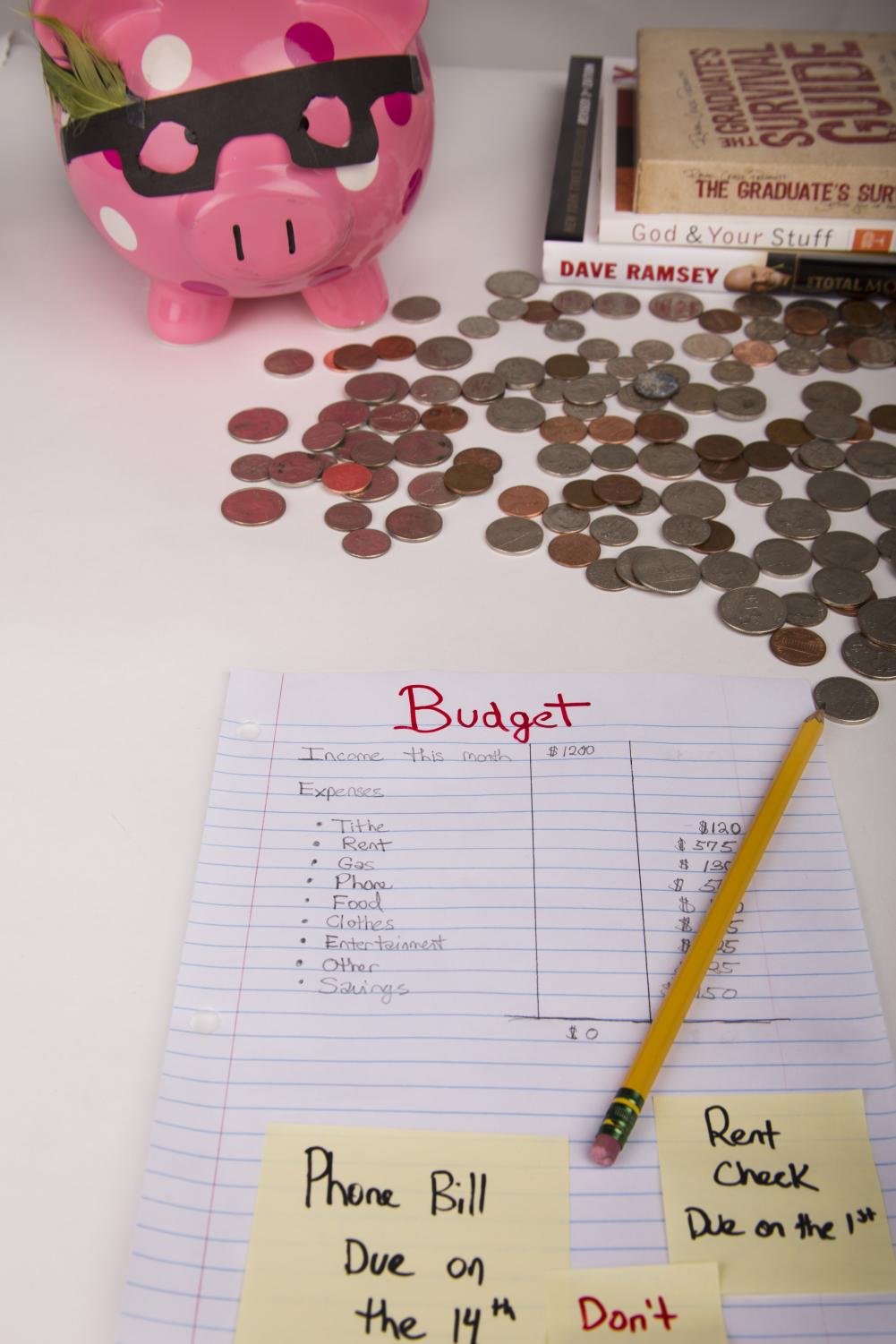Photography by Adam Lorona
Written by Tonika Reed
“I got loans because I didn’t know what else to do,” says sophomore art major Andrea De Luca. After applying for financial aid and many scholarships, De Luca still did not get enough awards to attend Biola debt-free.
De Luca says that she doesn’t keep a budget and doesn’t know how much money to save for emergencies. But De Luca is not alone. According to a recent survey of 100 Biola undergraduates conducted by The Point Magazine, 70 percent of students surveyed say they don’t make a budget, and 33 percent do not save money for emergencies.
In the wake of continued economic downturn, steps have been taken at Biola to foster a movement that refines students’ awareness of their God-given resources, especially in terms of budgeting and saving for moments of need. Biola’s movement, still in the stages of infancy, will help students become aware of how to use their money to take care of themselves and be prosperous in their future.
The Movement
Students, faculty and staff are joining together to make this next generation of students literate in the world of personal finance. In Biola’s Accounting Department, Doug Keller and Gwenn Schwartz are two staff members who see the necessity and importance of teaching financial stewardship and literacy. These two have spearheaded the Be Cash Smart Campaign, which began with intentionally placed business cards and posters around campus with the slogan “Be Cash Smart.” Keller calls the campaign an offshoot of the accounting department’s Affordability Initiative.
Borrowed Money
Tuition is on the rise, and more and more students are having to rely on financial aid and loans to finance their college dreams. The National Center for Education Statistics reports that in 2009-2010, 85 percent of undergraduates at 4 year institutions received some form of financial aid, with nearly 59 percent carrying student loans.
Jasmyn Alvarez, a junior psychology major says she has two jobs, tithes every month and estimates it will take her more than 10 years to pay off her school loans.
“I pay [down] three school loans every month,” Alvarez says. “I also pay for all my meals. And rent.”
According to the Biola Accounting Department, most students are aware that much of their money is borrowed and has to be paid back, but because it allows them to reach their goal of college, they assume that they can figure out how they are going to pay it back later. The Be Cash Smart Campaign is to help students understand what this loan debt is and how they can best combat it.
“For many students this is the first debt they have ever had,” Schwartz says. “So we want to make sure students don’t get in over their heads with this first debt experience.”
Being Cash Smart
The Be Cash Smart Campaign is linked to a website called Cash Course. Keller calls it a “springboard for a lot of content.”
The website makes resources on loan accountability and basic principles of money management accessible to students in a relevant way. Keller states that the website is just the beginning of the resources the accounting department wants to make available for students.
“This is our dream,” he says. “We really want to be visible on campus.”
Keller and Schwartz are looking for relevant ways to help students on campus be more aware of how they are spending their money. Schwartz states that debt is inevitable because Biola specifically is so expensive.
“We can be pretty sure that no student is going to get out of here with no debt,” she says.
Yet she and Keller are not pessimistic about this. They feel that since students cannot defy debt, education on how to deal with it gives students the confidence to be financially literate.
Money Matters to Students
Taylor Whitt, a senior business major and communications minor, also sees the need for students to be good financial stewards while in school so that they can be able to carry out God’s will for their lives without the stress of debt. Whitt started the Money Matters club as a project for his Authentic Communications class taught by Dr. Tim Muehlhoff and Dr. Rick Langer. For Whitt, it’s not just a project anymore. It’s a revival of financial literacy.
“This is a movement, and a lot of people are starting to follow,” Whitt says.
With 13 members currently, the club meets once every week to have training and discussion on the importance of financial stewardship and literacy. Whitt says he likes the setting, yet hopes to see numbers grow from 13 to about 20 people within the coming semester.
He says that the club is needed on Biola’s campus because during member recruitment at Biola’s Club Fair, people would approach them and say “Money matters, yeah it does.” Yet Whitt wants Biolans to “not just stop at saying this is important but actually take action.”
The club goes over a 5-chapter video series targeted at college students by Christian finance icon, Dave Ramsey. The series prompts discussion and also fosters accountability. Whitt hopes that students at Biola actually see where their money is going and do not neglect it or misuse it.
“I think we naturally look at money as this bad entity, like it’s immoral to have a lot of money, but when we are able to look at money as [an] amoral thing then we are able to see that whoever is in control of the money, that’s where the morals come into play,” Whitt says.
Whitt is passionate about creating a community that is not only financially literate, but one that is using their literacy for God’s glory.
“We need to practice both building our wealth and being able to give,” he says.
Whitt sees being a financial steward as a major part of financial literacy.
“It allows us to keep a kingdom perspective and it’s just a reminder that everything we have here is not ours and it is a gift from God. If we are using those resources to bring glory to him, then our eyes will be fixed on the right thing, which is God,” says Whitt.
Faith and Money
The faculty advisor for the Money Matters club is Dr. Rick Bee, senior director of Alumni and Parent Relations and professor of a Bible elective called Faith and Money. This class has been an ongoing resource for students in this movement of financial stewardship.
“Debt can actually enslave us from what God has called us to do,” Bee says.
The Federal Reserve and U.S. Census Bureau has found that the average American household has $91,000 in debt, and the total consumer debt has doubled since 1980. In 1980 the total consumer debt was $1.3 trillion; today it is $2.6 trillion.
The course, Faith and Money, is built from the Crown Financial Ministries program that began in 1985 with Larry Burkett. In the course of the semester, students identify what debt they have and are able to create a plan about how to get out of that debt. Bee hopes that, through this course, he can help soon-to-be alumni avoid living outside of their means.
In his book “Total Money Makeover”, Dave Ramsey cites a Wall Street Journal survey that states 70 percent of consumers in the U.S. live paycheck to paycheck. He also references a Gallup poll that reports that 60 percent of Americans could not cover a $5,000 emergency in cash without having to go into debt for it.
Bee states that when students graduate and want to get married, or go out and do missions, there are usually setbacks because of debt, and/or financial illiteracy. Bee says that students need to be more involved with their finances.
“Debt is a big deal,” he says.
Bee lets his students know that debt can hinder their future plans. If any student is currently carrying debt over $5,000 dollars, he meets with them outside of class to walk them through their plans of becoming debt free. Bee states that being financially literate means being a good steward of what God has given you. Using biblical text, Bee teaches his students that the concepts of giving back and tithing are vital to biblical stewardship.
“That paycheck is really God’s not yours,” says Bee.
The Challenge
Deuteronomy 8:17-18 says; “then you say in your heart, ‘My power and the might of my hand have gained me this wealth.’ And you shall remember the Lord your God, for it is he who gives you power to get wealth that he may establish his covenant which he swore to your fathers, as it is this day.” This movement of financial literacy is waiting for students to just dive in. The future of the movement is in their hands.





